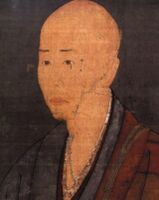Huikai: Difference between revisions
m (1 revision imported) |
No edit summary |
||
| Line 1: | Line 1: | ||
{{Person | {{Person | ||
|MainNamePhon=Wumen Huikai | |||
|SortName=Huikai, Wumen | |||
|namefirst=Wumen | |||
|namelast=Huikai | |||
|MainNameTib=無門慧開 | |||
|PersonType=Classical Chinese Authors | |||
|bio=Wumen Huikai. (J. Mumon Ekai; K. Mumun Hyegae 無門慧開) (1183-1260). In Chinese, "Gateless, Opening of Wisdom"; Chan master in the Linji zong; author of the eponymous ''Wumen guan'' ("Gateless Checkpoint"), one of the two most important collections of Chan gong'an (J. kōan; K. kongan). A native of Hangzhou prefecture in present-day Zhejiang province, Huikai was ordained by the monk "One Finger" Tianlong (d.u.), who also hailed from Hangzhou (see also Yizhi Chan). Wumen later went to the monastery of Wanshousi in Jiangsu province to study with Yuelin Shiguan (1143-1217), from whom Huikai received the ''wu gong'an'' of Zhao zhou Congshen; Huikai is said to have struggled with this gong’an for six years. In 1218, Huikai traveled to Baoyinsi on Mt. Anji, where he succeeded Yuelin as abbot. He subsequently served as abbot at such monasteries as Tianningsi, Pujisi, Kaiyuansi, and Baoningsi. In 1246, Huikai was appointed as abbot of Huguo Renwangsi in Hangzhou prefecture, and it is here that the Japanese Zen monk Shinichi Kakushin studied under him. Emperor Lizong (r. 1224–1264) invited Huikai to provide a | |||
sermon at the Pavilion of Mysterious Virtue in the imperial palace and also to pray for rain. In honor of his achievements, the emperor bestowed upon him a golden robe and the title Chan master Foyan (Dharma Eye). (Source: "Wumen Huikai." In ''The Princeton Dictionary of Buddhism'', 1002. Princeton University Press, 2014. http://www.jstor.org/stable/j.ctt46n41q.27.) | |||
|images=File:Wumen Huikai-Lamphams Quarterly.jpg | |||
|yearbirth=1183 | |||
|yeardeath=1260 | |||
|bornin=Hangzhou prefecture in present-day Zhejiang province | |||
|classification=Person | |classification=Person | ||
}} | }} | ||
== Full Name == | == Full Name == | ||
Revision as of 12:09, 21 July 2023
| PersonType | Category:Classical Chinese Authors |
|---|---|
| FirstName / namefirst | Wumen |
| LastName / namelast | Huikai |
| MainNamePhon | Wumen Huikai |
| MainNameTib | 無門慧開 |
| SortName | Huikai, Wumen |
| bio | Wumen Huikai. (J. Mumon Ekai; K. Mumun Hyegae 無門慧開) (1183-1260). In Chinese, "Gateless, Opening of Wisdom"; Chan master in the Linji zong; author of the eponymous Wumen guan ("Gateless Checkpoint"), one of the two most important collections of Chan gong'an (J. kōan; K. kongan). A native of Hangzhou prefecture in present-day Zhejiang province, Huikai was ordained by the monk "One Finger" Tianlong (d.u.), who also hailed from Hangzhou (see also Yizhi Chan). Wumen later went to the monastery of Wanshousi in Jiangsu province to study with Yuelin Shiguan (1143-1217), from whom Huikai received the wu gong'an of Zhao zhou Congshen; Huikai is said to have struggled with this gong’an for six years. In 1218, Huikai traveled to Baoyinsi on Mt. Anji, where he succeeded Yuelin as abbot. He subsequently served as abbot at such monasteries as Tianningsi, Pujisi, Kaiyuansi, and Baoningsi. In 1246, Huikai was appointed as abbot of Huguo Renwangsi in Hangzhou prefecture, and it is here that the Japanese Zen monk Shinichi Kakushin studied under him. Emperor Lizong (r. 1224–1264) invited Huikai to provide a
sermon at the Pavilion of Mysterious Virtue in the imperial palace and also to pray for rain. In honor of his achievements, the emperor bestowed upon him a golden robe and the title Chan master Foyan (Dharma Eye). (Source: "Wumen Huikai." In The Princeton Dictionary of Buddhism, 1002. Princeton University Press, 2014. http://www.jstor.org/stable/j.ctt46n41q.27.) |
| YearBirth | 1183 |
| YearDeath | 1260 |
| BornIn | Hangzhou prefecture in present-day Zhejiang province |
| Other wikis |
If the page does not yet exist on the remote wiki, you can paste the tag |
Full Name
Wumen Huikai, 1183-1260 (traditional Chinese: 無門慧開; Wade-Giles: Wu-men Hui-k'ai; Japanese: Mumon Ekai) (1183-1260)
Alternate Spellings:
Affiliation
Song period Ch'an master, 1183-1260
Biographical Data
Wumen compiled the collection of Zen anecdotes and koans, called in Chinese the Wumenguan (The Gateless Gate), in Japanese the Mumonkan. These stories were some of the first and most well known that were translated into English in the 20th century.
Wumen Huikai (traditional Chinese: 無門慧開; Wade-Giles: Wu-men Hui-k'ai; Japanese: Mumon Ekai) (1183-1260) is a Song period Chán (Japanese: Zen) master most famous as the compiler of and commentator on the 48-koan collection The Gateless Gate (Japanese: Mumonkan). Wumen was at that time the head monk of Longxiang (Wade-Giles: Lung-hsiang; Japanese: Ryusho) monastery. Wumen was born in Hangzhou and his first master was Gong Heshang. However, it was Zen master Yuelin Shiguan (月林師觀; Japanese: Gatsurin Shikan) (1143-1217) who gave Wumen the koan "Zhaozhou’s dog", with which Wu-men struggled for six years before he finally attained realization.

